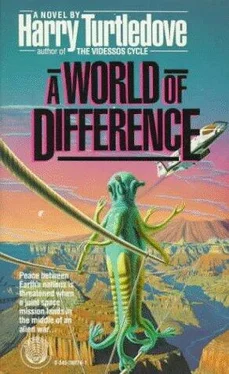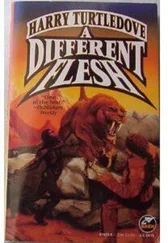“What?” Bryusov said.
“He would look very strange, driving a large American car.” “So he would.” Bryusov permitted himself a smile, but it was a nervous one. “Moscow will not find it funny,” he warned. “I doubt Oleg Borisovich will, either.”
“There is that,” Tolmasov said. Still, he wanted to be there when Lopatin got the news, just to see his expression.
Fralk made a noise that sounded amazingly like a woman clearing her throat when the two men with whom she is at dinner have spent too much time talking about their jobs and not enough with her. Tolmasov shook his head at the irony of that marvelous voice being wasted on an alien, and, the Russians had learned, a male alien at that. The colonel bowed to Fralk in polite apology for his woolgathering.
The Minervan widened himself in turn. “Want more-“ He pointed at the hatchets and hammers again, and also at a box of little battery-powered lamps.
“Shall we give him more of the axes?” Bryusov asked.
“Well, why not? We brought them to trade, and the local tools and books and specimens we get in return will be worth a lot more than their weight in diamonds back on Earth. Still, I suppose you have a point, Valery.” Tolmasov tried to use his tiny Minervan vocabulary. “These-“ He pointed to the hatchets himself. “What you do with? Use for?” “Use on Omalo.”
Tolmasov took a certain small pride in noticing Fralk had chosen a preposition different from the one he had used. The object of the preposition, though, remained obscure. “Omalo? Omalo is what?” he asked.
Fralk said something. “Ervis Gorge” was all the colonel understood: the local name for Jotun Canyon. He turned to Bryusov. “Did you follow that?”
The linguist frowned. “The Omalo are something across Ervis Gorge.”
Tolmasov frowned, too. That was better than he had done, but not enough to tell him much. “Again please, slowly,” he said to Fralk.
The Minervan pointed to himself. “Skarmer,” he said. He pointed to the castle where his king? grandfather? relived, the castle that was much the biggest building in this settlement. “Hogram Skarmer.”
“A surname?” Tolmasov asked.
“We’ve seen no signs of such yet,” Valery Bryusov answered. “And while he might use an ax on Hogram, he would not use one on himself. Besides, let him go on-I don’t believe he’s finished.”
The linguist was right. Seeing he had not yet made his point, Fralk said, “Ervis Gorge-this side-Skarmer-all.” He waved his six arms to emphasize his words. “Ervis Gorge-across-Omalo.”
“Borezmoi,” Tolmasov said softly. He was afraid he did understand that. “Valery, I think he’s trying to tell us these Omalo on the other side of the canyon are another whole country. I think we should think three times before we go arming these folk for war.”
“I think also, Sergei Konstantinovich, that we should consult with Moscow,” Bryusov said.
The colonel made a sour face. Bryusov wanted to consult with Moscow to decide which pair of socks to put on in the morning. Then, reluctantly, Tolmasov nodded. “I am afraid you are right. The Americans, after all, are also on the other side of Jotun Canyon. War against them, even by proxy, would not be well received back home, I suspect. We came too close to falling off the big cliff, the nuclear cliff, in Lebanon.”
“We need to learn more of the situation here as well,” Bryusov said.
“So we do.” They could not hope to learn enough, either, Tolmasov thought, not in the limited time they had on Minerva. In the end, they might act anyway. People did things like that.
“Shall we tell the Americans?” Bryusov asked.
“We’ll let Moscow worry about that, too,” Tolmasov decided. “If it were my choice, though, I’d say no, at least not yet.”
Reatur finished cleaning the chamber where the new budlings had burst into the world. It was somber work. That was one of the reasons he did not give it to the mates. The other, of course, was simply that, being as they were, they would have done a bad job of it.
He dragged Biyal’s corpse out of the room, toward the door that kept the mates in their own part of the castle. The evening was growing dark, and he hoped the mates would be back in the little rooms where they slept.
Seventeen evenings out of eighteen, they would have been. Even tonight, most of them were. But Numar and Lamra were still chasing each other up and down the hall. They came to a stumbling stop when they saw the domain master and his burden.
“It’s Biyal,” Numar said.
“How sad,” Lamra echoed. But she did not sound full of grief, no more than if she were speaking of a broken pot or, at most, a dead animal she did not care much about one way or the other. She was too young to grasp that Biyal’s fate awaited her as well. As if to underscore that, she said, “Feel me, Reatur. I think I’m going to bud.”
Reatur ran fingers along her body. Sure enough, the barest beginnings of bulges were there. “I think you are, too, Lamra,” he said, as gently as he could.
“Good,” Lamra said. No, Reatur thought, she did not understand the connection between buds and death that so abridged mates’ lives. Sadness pressed on him. Lamra was a mate he cared for more than he had for any in years. She was more uniquely herself than most mates ever got to be in their limited spans. He would miss her when her time came. Maybe, he thought, a minstrel would be visiting the domain then, and he could pay the fellow for a song by which to remember her.
While he was musing, Numar was getting bored and annoyed that no one was paying attention to her anymore. She poked Lamra with three arms at once, then raced off down the hail. Letting out a squawk loud enough to wake half the mates who were sleeping, Lamra dashed after her.
Reatur got Biyal out of the mates’ quarters and barred the door behind him. He was taking the corpse to the fields when he almost ran into Enoph, who was on his way back from the humans’ flying house. More questions, Reatur supposed; the humans asked more questions and poked their eyes-even without eyestalks-into more places than any people the domain master had ever known. If they had not been so spectacularly strange looking, he would have suspected them of being Skarner spies.
Enoph peered through the gloom. When he recognized what Reatur was dragging after him, he asked, “Would you like me to take care of that for you, clanfather?”
“Eh? No, thank you, Enoph. Mates get all too little in life; I try to give them what I can, and to honor them as I can after they die, as well.”
Enoph opened and closed a hand in agreement. “Yes, I think you act rightly, clanfather. I have two mates in my booth, and treat them as well as I can. For one thing, they’re more fun to be with that way than when you don’t try to train them and just leave them like animals.”
“I certainly think so,” Reatur said.
“Are the budlings well?” Enoph asked.
“The male is large, and seems sturdy. So do the five mates, come to that.” Reatur let air sigh through his breathing pores. “Time will tell.” So many budlings died young. If a male lasted five years, he might well live a long life… if. Many mate budlings never lived to receive buds themselves. And those who did, no matter how strong and healthy they were, had only Biyal’s fate to look forward to.
“How many males is it for you now?” Enoph asked.
Reatur had to count on his fingers and was not quite sure even when he had finished. “I think this puts me within three of filling my fourth eighteen,” he said at last.
“A goodly sum,” Enoph said. In the gathering darkness, Reatur could hardly see the younger male’s eyestalks. “I’ve had four myself, only one still alive. The mates budded with them have not done well, either.”
Читать дальше












